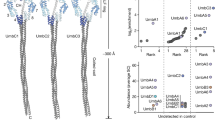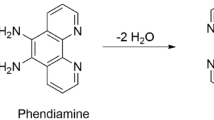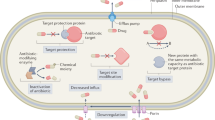Abstract
IT has been shown that iodoacetamide1 (CH2ICONH2) and potassium iodide2 enhance the radiation inactivation of radiation resistant bacteria. Similar results have been obtained with iodoacetic acid3,4. Dean and Alexander2 found that sensitization with iodoacetamide was observed in. Micrococcus sodonensis only when the bacteria and sensitizer were irradiated together, indicating that sensitization was not caused by blocking of intracellular sulphydryl groups before irradiation or by the production of a stable toxic product. It was later demonstrated that some short lived transients of iodoacetamide were responsible for the sensitizing effect5. These transients would be formed by the reaction of iodoacetamide with the radiolytic products of water. The two principal species produced by irradiation of aqueous solutions are the solvated electron  and the hydroxyl radical (OH). (For a comprehensive review of this subject see ref. 6.) The aim of the present investigation was to discover which of these species was involved in producing the toxic short lived transient and to determine the nature of this transient in iodoacetamide and potassium iodide. This could be done by studying the effect of scavengers for the solvated electron and the hydroxyl radical on the sensitizing ability of iodoacetamide and potassium iodide. Our results suggest that the iodine atom (I·), produced by the OH radical attack on the sensitizers, was responsible for the observed sensitization.
and the hydroxyl radical (OH). (For a comprehensive review of this subject see ref. 6.) The aim of the present investigation was to discover which of these species was involved in producing the toxic short lived transient and to determine the nature of this transient in iodoacetamide and potassium iodide. This could be done by studying the effect of scavengers for the solvated electron and the hydroxyl radical on the sensitizing ability of iodoacetamide and potassium iodide. Our results suggest that the iodine atom (I·), produced by the OH radical attack on the sensitizers, was responsible for the observed sensitization.
This is a preview of subscription content, access via your institution
Access options
Subscribe to this journal
Receive 51 print issues and online access
$199.00 per year
only $3.90 per issue
Buy this article
- Purchase on Springer Link
- Instant access to full article PDF
Prices may be subject to local taxes which are calculated during checkout
Similar content being viewed by others
References
Dean, C. J., and Alexander, P., Nature, 196, 1324 (1962).
Dean, C. J., and Alexander, P., Prog. Biochem. Pharmacol., 1, 46 (Karger, Basle/New York, 1965).
Bridges, B. A., Radiat. Res., 16, 232 (1962).
Lee, J. S., Radiat. Res., 19, 593 (1963).
Dewey, D. L., and Michael, B. D., Biochem. Biophys. Res. Comm., 21, 392 (1965).
Pulse Radiolysis (edit. by Ebert, M., Keene, J. P., Swallow, A. J., and Baxendale, J. H.) (Academic Press, London and New York, 1965).
Singh, B. B., Charlesby, A., Keene, J. P., and Swallow, A. J., Third Intern. Cong. Red. Cortina D'ampezzo (abstract) (1966).
Dainton, F. S., and Peterson, D. B., Proc. Roy. Soc., A, 267, 443 (1962).
Grossweiner, L. I., and Matheson, M. S., J. Phys. Chem., 61, 1098 (1957).
Senvar, C. B., and Hart, E. J., Proc. Second UN Intern. Conf. Peaceful Uses of Atomic Energy, 29, 19 (UN, Geneva, 1958).
Daniels, M., and Wigg, E. E., J. Phys. Chem., 71, 1024 (1967).
Thomas, J. K., J. Phys. Chem., 71, 1919 (1967).
Author information
Authors and Affiliations
Rights and permissions
About this article
Cite this article
MULLENGER, L., SINGH, B., ORMEROD, M. et al. Chemical Study of the Radiosensitization of Micrococcus sodonensis by Iodine Compounds. Nature 216, 372–374 (1967). https://doi.org/10.1038/216372a0
Received:
Published:
Issue Date:
DOI: https://doi.org/10.1038/216372a0
This article is cited by
-
Influence of halogenated deoxyuridines on the radiation sensitivity ofEscherichia coli
Experientia (1968)
-
Radiochemical basis of sensitisation ofStaphylococcus aureus by vitamin K5
Proceedings / Indian Academy of Sciences (1968)
Comments
By submitting a comment you agree to abide by our Terms and Community Guidelines. If you find something abusive or that does not comply with our terms or guidelines please flag it as inappropriate.



